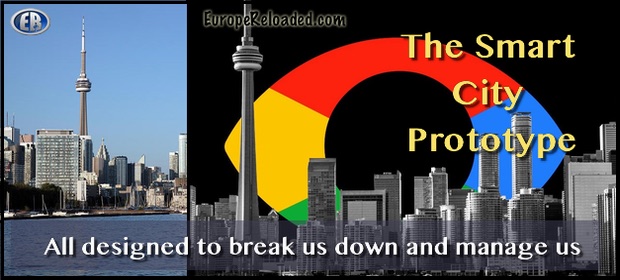
THE WORLD’S MOST ambitious “smart city,” known as Quayside, in Toronto, has faced fierce public criticism since last fall, when the plans to build a neighborhood “from the internet up”
were first revealed. Quayside represents a joint effort by the Canadian government agency Waterfront Toronto and Sidewalk Labs, which is owned by Google’s parent company Alphabet Inc., to develop 12 acres of the valuable waterfront just southeast of downtown Toronto.
In keeping with the utopian rhetoric that fuels the development of so much digital infrastructure, Sidewalk Labs has pitched Quayside as the solution to everything from traffic congestion and rising housing prices to environmental pollution. The proposal for Quayside includes a centralized identity management system, through which “each resident accesses public services” such as library cards and health care. An applicant for a position at Sidewalk Labs in Toronto was shocked when he was asked in an interview to imagine how, in a smart city, “voting might be different in the future.”
…
From the start, activists, technology researchers, and some government officials have been skeptical about the idea of putting Google, or one of its sister companies, in charge of a city. Their suspicions about turning part of Toronto into a corporate test bed were triggered, at first, by the company’s history of unethical corporate practices and surreptitious data collection. They have since been borne out by Quayside’s secret and undemocratic development process, which has been plagued by a lack of public input — what one critic has called “a colonizing experiment in surveillance capitalism attempting to bulldoze important urban, civic and political issues.” In recent months, a series of prominent resignations from advisory board members, along with organized resistance from concerned residents, have added to the growing public backlash against the project.
The piece below republished from the Toronto Star considers the psychological effects on people living in these conditions.
********
Smart Cities Promote Social Isolation, Not Togetherness
George Orwell’s novel 1984, published in 1949, imagines a society organized by a totalitarian state where daily life is regimented and Big Brother programs every move. Not a totalitarian government, but corporate power, combining with new applications of information technologies, may be leading us to a similar society.
Undoubtedly digital technologies are transformative. The instant communications of the internet, the joy of FaceTime with friends and relatives, and Google’s vast trove of information have immeasurably enriched human life. Cellphones have made almost the whole world accessible.
What digital technologies have done in medicine, industries, transportation, commercial dealings are no less than a miracle. Yet it does not mean that they are without social costs and that every new use of these technologies will increase human welfare.
The digital technologies combined with sensors and satellites are now being applied to our daily activities, threatening the bases of social organization and human relations. We are increasingly being programmed to act, behave and relate with each other in predetermined ways.
Two trends are striking: reduction in human contacts and face-to face dealings, and the loss of spontaneity and personal decision-making in daily life, increasing social isolation and regimentation.
Google’s proposed Sidewalk Labs in Toronto envisions a technology-led urban neighbourhood. The public discussions of these plans focus on privacy, ownership of data and surveillance, the regimented social life coming with its algorithms-driven neighbourhood should be of equal concern. Let us look at some trends already underway.
The new shopping experience is meant to liberate us from waiting in line and dealing with a cashier by picking, selecting, scanning and paying for groceries and other goods by ourselves. Shopping online brings clothes, shoes, even cars. Skip the Dishes will deliver favourite food at your doorstep. One can work from home without the companionship of co-workers. Apps, programmes and algorithms are shredding human connections and casual encounters.
Driverless cars are on the horizon and smart cities are the new promise. Smart technologies will not only relieve us of decision-making but also guide us in our everyday life. Is this not the 1984 embraced voluntarily without a visible big brother?
The social fallout of these smart modes of living is social isolation, loneliness, loss of personal choices and freedom to make decisions. The penetration of digital technologies, in the name of economic efficiency, in our small, casual and everyday interactions erodes opportunities for human connections.
Erving Goffman (1922-82), a Canadian-American sociologist, has documented the significance of casual interactions with cashiers, waiters, taxi drivers or neighbours in building a social order. We are willingly surrendering these opportunities. The cross-national evidence of social isolation, loneliness and living alone illustrates the consequences.
In the U.S., CIGNA, a global heath services company in a 2018 survey using UCLA loneliness scale, found that generation Z (18-22) and millennial (23-37) have surprisingly higher loneliness scores than the elderly.
A Statistics Canada 2019 study shows that the percentage of persons living alone increased from 9 to 14 per cent between 1981 and 2016. The fastest growth of persons living alone was among those 35-64, more than the rate for the elderly.
The U.K. has established a Ministry of Loneliness. It has been necessitated as an issue of national health. The CIGNA study concludes technology is contributing to social isolation.
Undoubtedly it is not necessary to arrest the advance of technologies. However, new applications of information technology should be required to carry out social impact assessments, from the perspective of preserving community life and strengthening human bonds.
Circling back to Sidewalk Lab in Toronto, its planning should have an explicit objective of protecting human connections, casual encounters and choices for people to organize their everyday life.
Engineering professor Dr. Shoshana Saxe of the University of Toronto points out in her article in the New York Times that technological breakdowns, obsolescence and unpredictable conditions make smart cities unreliable. She observes: “Tech has a place in cities, but that place is not everywhere.” Certainly not in regulating social life.
Original article

••••
The Liberty Beacon Project is now expanding at a near exponential rate, and for this we are grateful and excited! But we must also be practical. For 7 years we have not asked for any donations, and have built this project with our own funds as we grew. We are now experiencing ever increasing growing pains due to the large number of websites and projects we represent. So we have just installed donation buttons on our websites and ask that you consider this when you visit them. Nothing is too small. We thank you for all your support and your considerations … (TLB)
••••
Comment Policy: As a privately owned web site, we reserve the right to remove comments that contain spam, advertising, vulgarity, threats of violence, racism, or personal/abusive attacks on other users. This also applies to trolling, the use of more than one alias, or just intentional mischief. Enforcement of this policy is at the discretion of this websites administrators. Repeat offenders may be blocked or permanently banned without prior warning.
••••
Disclaimer: TLB websites contain copyrighted material the use of which has not always been specifically authorized by the copyright owner. We are making such material available to our readers under the provisions of “fair use” in an effort to advance a better understanding of political, health, economic and social issues. The material on this site is distributed without profit to those who have expressed a prior interest in receiving it for research and educational purposes. If you wish to use copyrighted material for purposes other than “fair use” you must request permission from the copyright owner.
••••
Disclaimer: The information and opinions shared are for informational purposes only including, but not limited to, text, graphics, images and other material are not intended as medical advice or instruction. Nothing mentioned is intended to be a substitute for professional medical advice, diagnosis or treatment.




